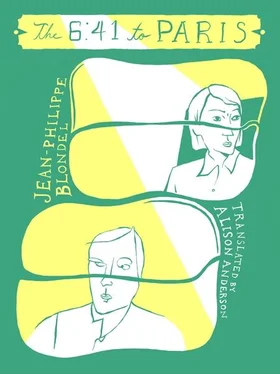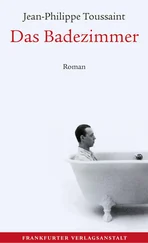At the end of his life my father worked in Paris. Promotion, career, money, prestige. He had it all figured out. He made his choice. He saw his wife and kids only two hours in the evening and two days on the weekend. It was just a question of months or a few years — and then they’d move south for their retirement, build a little house, it was all planned out, ordained, on course. But then one day he had a heart attack, when he was changing Métro lines. Defibrillators didn’t exist back then. There were calls for help, people rushing over, gathering around, someone shouted, “I’m a doctor!” like in some second-rate TV show. But it wasn’t enough. For three years my mother was inconsolable, and then she met this charming bicycle salesman who had just gotten divorced. They went on long rides together.
I’m aware that history is repeating itself.
I’m trying to fight it.
I figure that bicycle salesmen and doctors are not the same thing.
Or are they?
I also figure that I got divorced before, that I won’t kill myself working, and that I won’t end up dead in a Métro passageway. Unless I do today.
No.
I close my eyes while the ubiquitous female voice announces the arrival of the train in the station. I’d like to meet her someday, that woman. I wonder what she’s like in real life. Does she spend her time recording messages such as “train number one thousand three hundred (pause) and fifty is currently delayed by (pause) five minutes?” How does she see her future? What does she like to do when she’s not at work?
Above all I wonder how long this recorded voice has been making its announcements to passengers. I remember a day just like this. All those years ago. I took the same train — or its twin brother. I was seventeen. With Mathieu. It was the end of April, just like today. Easter vacation. We were leaving for Les Landes for a few days, to go camping. We’d been dreaming about our week on the coast for months. All the other students were green with envy. We were freedom personified. If I let myself go a little, I can even feel the weight of the tent and the backpack on my shoulders. And the impression I had that the whole world was opening up to me.
It was a disappointment. The campsite was deserted, so was the resort, there was nothing to do except go cycling in the dunes. The sea was still freezing and the beach hadn’t been cleaned. You had to watch out for the clumps of tar that had collected in the sand. In the end we went home one day early, relieved to be among company and laughter and noise. Or at least I was. I don’t know about Mathieu. He has always been very nostalgic about that vacation. He has often gone back to that stretch of coast. The only nostalgia I feel is for the moment of departure.
I could do it all over again today.
After all, no one is really expecting me. I disappear. My kids miss me a little, but mainly they are disturbed by the fact they don’t know if I’m alive or dead. So I send them a postcard to reassure them. They go on with their lives. They notice that my absence doesn’t make that much difference. At my work, they are concerned, then they react. Before long they brand me a deserter and I am fired. They find someone younger and more energetic to replace me, and who smiles more. In the meantime I’m up in the air and I land far away — in a place where the tumult of the world might still seem like just a faint whisper — Mongolia, Bolivia, a country like that, somewhere I’ve never been to. I had plans to travel. A lot of plans. And then, I don’t know, one thing led to another, work, marriage, children, divorce. Most of the time purchasing power didn’t go far enough. Neither did courage. I never made it very far. Spain twice, with the kids, to those concrete-covered resorts. Ireland, because Christine wanted to go there — I thought we’d find unspoiled nature and we’d be able to walk for miles without meeting another soul, and I found myself in the Mecca of European tourism. Florence, when I was young.
Until I was twenty-five, I crisscrossed France by train because my dad worked for the national railway so I had a hefty discount on tickets. But there wasn’t much of a discount once you crossed the border. And I didn’t have anyone to go with me. So most of the time I stayed in France. There was that trip to Florence. Another to London. And a week in Brussels. Not much to show. I’ve never even set foot in the United States, despite the fact that I used to go on about how much I wanted to see America.
I could start traveling now.
I could transform the Métro into the regional RER. Paris into Charles de Gaulle airport. Mathieu into the rest of the world. My head is spinning, sort of. Not what I expected when I left the house this morning.
Shit.
It nearly made me forget to get on the train.
Here I am, dreaming of escape, and I almost got left behind on the platform.
The doors slammed shut right behind my back.
That was a close one.
I love to hear the sound of the doors closing. It signals the beginning of an egocentric and self-indulgent interlude. For the next two hours, nothing can really happen to you. Everything is taken care of. You can decide to immerse yourself in a novel, or succumb to the trance of the music coming from your headphones. You can also vanish into the screen of your laptop, into emails, spreadsheets, numbers, reports, and establish a direct yet disembodied connection with the outside world.
I don’t do any of that. I daydream. Train journeys are rare opportunities to let go and lower my guard. Whereas in the Métro or the RER I can’t do that. I’m always on the alert.
The seat next to me has not been taken.
It stays empty.
The train starts to move.
I’m of two minds.
On the one hand, I’m relieved. It’s true that it’s a bit weird, the closeness you get in a railroad car. You’re only a few inches away from another person, another story, and you know that in the event of a crash, your skin will mingle with theirs. And then, these SNCF seats aren’t comfortable. A little more room would be great. Room enough to stretch out and doze off, if you feel like it, all the way to the Gare de l’Est — and catch up on lost sleep. We’re all trying to catch up on lost sleep. When you’ve got a neighbor, you have to sit up straight, almost like at school, and when the conductor goes by, you almost feel like raising a finger and saying, “Present.”
But another side of me wants to protest. Why am I the only one without a temporary partner? Am I giving off the sort of body odor that immediately deters any hypothetical candidates? Am I that ugly? Do I frighten them? Intimidate them? So here I sit, the only person sitting alone in the whole car — isn’t there even some old lady who could come and keep my thoughts from going round in circles? Or some vague acquaintance I could chat with about the weather or the passage of time?
I wonder what the other passengers think when they look at me. They see a woman who is neither young nor old, fairly well preserved. A somewhat inscrutable expression, lips that could stand to be a little fuller, a deep line across her forehead, two others on either side of her mouth. Light makeup. Nicely tailored clothes. Discreet elegance. Relatively slim figure. Why isn’t she traveling first class?
For the simple reason that the 6:41 is a regional train, where the differences in comfort between first and second class are minimal. And besides, the number of first-class seats has been so drastically reduced that the half-car devoted to first is often jam-packed, while there are still empty seats in second class. Well, usually. Today the entire train is jammed. All that’s left is the orphaned seat next to me. A privilege I would not have enjoyed in first class, where I would probably be stuck next to some corpulent senior executive reeking of aftershave, who would spend the entire time calling his superiors or his underlings, in spite of the notice requesting cell phones in sleep mode.
Читать дальше












